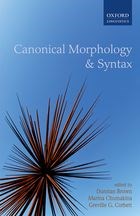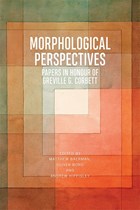Canonical Typology
- Approaches
- Overview
- Canonical Typology bibliography
- Workshop on Creating Infrastructure for Canonical Typology
- FAQs
FAQs
No. Since being canonical typically depends on meeting various criteria fully, there are many ways not to be canonical. Hence what is fully canonical may well be rare, and may well be non-existent.
When successful, they establish an agreed point from which we can calibrate the real examples we find. Physicists measure from absolute zero, without having anything at that temperature in the vicinity!
A good question. The whole approach is justified precisely by how useful it is found to be. It arose from an attempt to give a typology of agreement systems, which was a fraught area: linguists had clear ideas of what was and was not agreement, while in many instances not realizing that the next linguist’s intuitions were equally clear but overlapped only in part. The approach has proved useful in pulling apart the different facets of phenomena such as agreement and of the definitions of such phenomena. As Nikolaeva (2013: 100) puts it: ‘the canonical approach breaks down complex concepts in a way that clarifies where disagreements may lie between different linguists and theoretical frameworks.’




